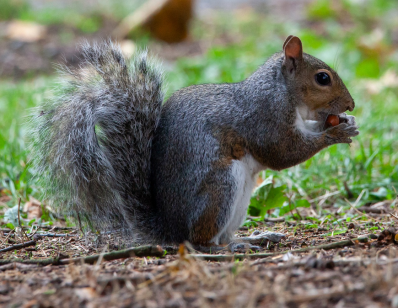Passive voice: grey squirrel
The Grammar Bit!
When writing, we have the choice of using either the active or the passive voice. The first three sentences opposite use the active voice. You’ll notice that the agent or ‘doer’ of the action, the subject (bold), appears before the receiver of the action, the object (underlined). This has the effect of putting the focus on the subject, and it gives each sentence a very strong, clear voice.
Though less frequently used in speech and writing, the second three sentences use the passive voice. You’ll notice that in each sentence, the agent of the action has moved to the end and the receiver of the action has moved to the front (becoming the new subject). Notice how the preposition ‘by’ is used in the passive voice to introduce the agent.
When writing in the passive voice, you may decide to leave out the agent of the action altogether (indicated by the brackets). This is known as the agentless passive! Discuss the effect of this with your talk partner. Why might you want to leave out the agent or ‘doer’ of the action?
Scintillating Sentences
Active voice
1) The thief is watching the other squirrel bury his nut.
2) The crafty squirrel deceived his opponent.
3) The ravenous rodent sniffed the nut to see if it was ripe enough.
Passive voice
1) The squirrel, who is burying his nut, is being watched (by the thief).
2) The opponent had been deceived (by the squirrel).
3) To see if it was ripe enough, the nut was sniffed (by the ravenous rodent).

Did you know?
Squirrels do an important job spreading the growth of oak trees. This is because not all of the acorns that they stash are unearthed during the winter months. This means that those remaining in the ground have the chance to germinate and grow into healthy trees.

